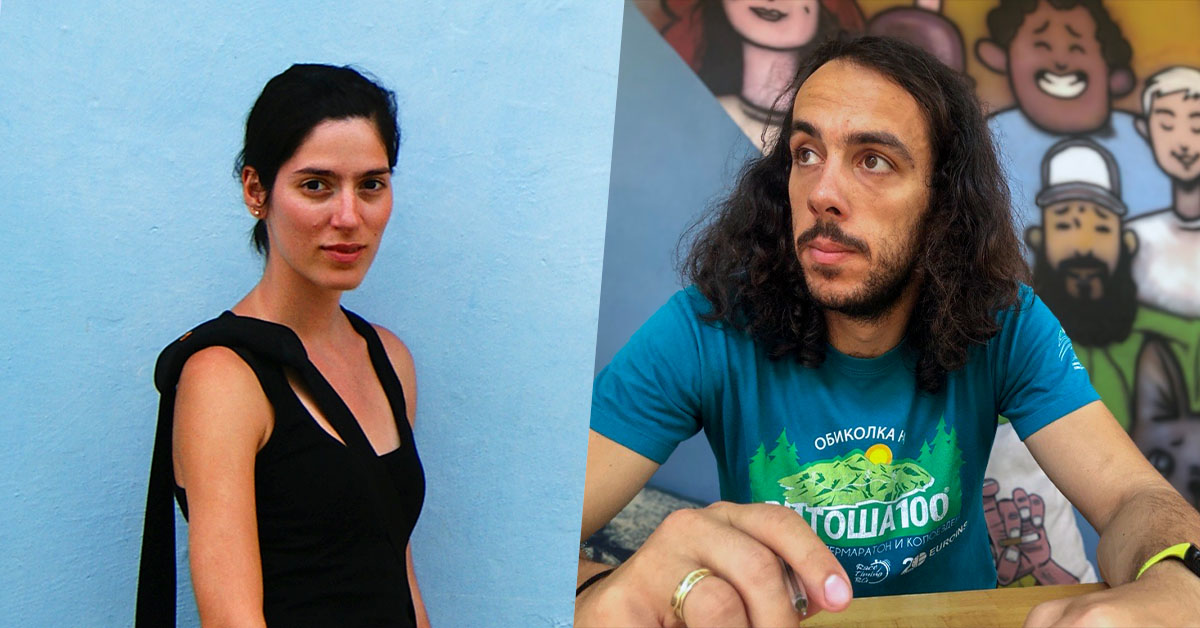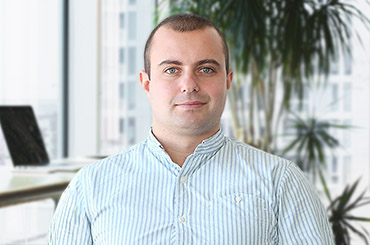At Telerik Academy, we're dedicated to offering real work experience – not only for our learners but also for our colleagues. It is important for us to foster continuous skill refinement. That is why we started an internal project aiming to enhance our tech trainer’s dev skills. Through ongoing development opportunities, we empower them to enrich their expertise, adding more and more skills and competences and keeping their dev knowledge up to date while at the same time adding value for our students.
Meet Eli and Chavo, who switched to a dev role for 3 months and worked on two distinct yet compelling projects. Both graduates of the Telerik Academy’s Alpha programs, they stepped into the shoes of software developers to be even better role models for their students. Check out how this was possible.

Present yourself briefly.
Chavo: I’m Chavdar Dimitrov or Chavo. I started working as a Technical Trainer at Telerik Academy after graduating from Alpha. Personally, I like to spend some quiet time in the mountains or run early in the morning.
Eli: Hi, I am Elitsa, а Java Technical Trainer at Telerik Academy. I am a Telerik Academy alumnа too, but outside the tech world I am a wannabe in several areas, like gardening and birdwatching.
Can you describe the process that facilitated your transition from a tech trainer to a developer role? Did you have mentors guiding you along the way?
Chavo: Transitioning from a tech trainer to a developer role was as smooth as possible. We first discussed this opportunity with my manager and our developer team. We aligned the tasks and activities that would be part of my duties during the 3-months period in my developer role. Additionally, I learned that one of my colleagues would be mentoring me in this new role.
Eli: At Telerik Academy Alpha we offer real-world work experience to our students. For me moving to the dev team felt like that but on a completely different level – it’s like moving to a new job – you get a task, a deadline, and a senior to guide you – in our case – the Telerik Academy CTO and an experienced colleague from the Dev team. But in this case, the “new job” came with two great advantages – one, I already knew the people I was about to work with (duh), and two, my mentor is among the most experienced members of our team, especially in terms of training and mentoring. We have daily meetings to discuss my progress and challenges, to brainstorm and debug, which helps keep me on track with my tasks.
What specific skills or knowledge do you aim to acquire during your time working on development projects and how do they align with your personal and professional goals?
Chavo: I had several goals. My first goal was to help me add more abstraction layers over the theoretical topics. This way, I could be more precise in explaining a topic to our students and what details are essential in their current training phase. My second goal was both personal and professional, but primarily personal – to be into the shoes of software developer at Telerik Academy. On one hand, I could already give even more crucial details to students on their question, "What does a developer do?". On the other hand, I would have been in an active dev role for three months, which was my initial intention when applying for Telerik Academy Alpha.
Eli: Before my “temporary transfer” I was given the chance to choose a tech stack to work with and areas to explore. I preferred to stick with Java and gravitate around what we teach at the Academy but taking it a bit further. I listed some tools and libraries that we don’t specifically show our students, or that I wanted to explore more. So, if the ultimate goal is to be better at what I do as a trainer and a developer, I believe these are important first steps.
Looking ahead, how do you envision integrating the experiences and skills you gained from working on development projects into your role as a tech trainer?
Chavo: It will make me a better role model for the students. I could be more confident in answering more broad questions like "Would I need this in practice?" and "Is this the best practice?". I will be more patient when encountering an error and trying to fix it. I will look at their whole journey and better judge which topics I should focus on.
Eli: Obviously, being part of the dev team helps me grow as a developer and these are skills I am taking back to my usual role. But another thing I really appreciate is the way I am being mentored. I am taking mental notes about it, and I will definitely put into practice with our students what I’ve learned from this experience too.
What skills and experiences do you find are transferable from your tech training role into the dev role? Were there some that surprised you?
Chavo: All my skills and experiences are transferable. There are hard skills like knowing how to work with OOP language, Git, and the ability to understand written code. Soft skills were also crucial, such as being proactive in asking questions, active listening, responding to feedback, and primarily mental toughness. It surprised me how important it is to never give up in the face of an existing problem and approach it from different angles. My mentors were great tutors who taught me how to understand a complex programming concept or resolve a development problem.
Eli: Patience. And also, being more or less in the shoes of our students, I had to remember all the advice I have been giving them to cope with their projects, and to… well, follow them.
We heard that, during the practical part of the program, you had weekly tech sessions. Can you share more about those sessions and what is the most impressive thing you've learned?
Chavo: During the weekly tech sessions, we discussed what I have done in the past week and the goals for the upcoming week. We also discussed a specific topic in detail, such as the lifetime of an object. We also had knowledge-sharing sessions where we discussed topics like dependency injection and exception handling in detail.
Eli: These were sessions where the CTO and our mentor took the time to discuss with us in depth topics like dependency inversion, bean scopes, the different ways functional and object-oriented languages cope with same challenges, etc. If I have to name one thing that impressed me, that would be that the way java uses exceptions is a bit of overkill.
This story of Chavo and Eli reflects our ongoing commitment to improvement and the symbolic relationship between teaching and learning. As they return to their roles as tech trainers, they're bringing back more skills and a new perspective. At Telerik Academy, it's not just about technical proficiency; it's about instilling values like proactivity, patience, and tenacity. This philosophy is the very essence of what we aim to convey to our students.
If you want to learn programming from the best trainers and be part of a holistic 6-month program,
apply for Alpha.






.jpg?sfvrsn=8f8e9c1f_2)
